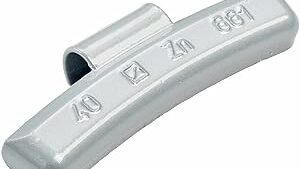Basic Guide What is Wheel Balancing?
In this article, we will delve into what wheel balancing is, why it is important, and how it is performed. Wheel balancing is a critical aspect of vehicle maintenance that ensures a smooth and safe driving experience. It involves correcting the weight distribution around the wheel and tire assembly to prevent vibrations and uneven tire wear.
What is Wheel Balancing?
Wheel balancing, also known as tire balancing, refers to the process of equalizing the weight of the combined tire and wheel assembly so that it spins smoothly at high speeds. When tires are unbalanced, they can cause vibrations that can be felt in the steering wheel, floorboard, or seat, depending on which wheel is unbalanced.
Why is Wheel Balancing Important?
- Smooth Ride: Properly balanced wheels ensure a smooth and comfortable driving experience by eliminating vibrations caused by uneven weight distribution.
- Tire Longevity: Unbalanced tires can cause uneven tire wear, leading to premature tire replacement. Balancing your wheels helps extend the lifespan of your tires.
- Improved Handling: Balanced wheels enhance vehicle handling and stability, providing better control and safety, especially at high speeds.
- Prevent Damage: Continuous driving with unbalanced wheels can cause damage to suspension and steering components due to excessive vibrations.
- Fuel Efficiency: Balanced wheels reduce rolling resistance, which can help improve fuel efficiency and lower overall fuel costs.
Signs That Your Wheels Need Balancing
- Vibrations: One of the most common signs of unbalanced wheels is vibrations in the steering wheel, floorboard, or seat, especially at higher speeds.
- Uneven Tire Wear: If you notice that your tires are wearing unevenly, it may indicate that your wheels are out of balance.
- Noisy Tires: Unbalanced tires can produce unusual noises, such as humming or buzzing, particularly at higher speeds.
- Poor Handling: Unbalanced wheels can cause your vehicle to handle poorly, making it difficult to maintain control.
How is Wheel Balancing Performed?
Wheel balancing is typically performed by a professional mechanic using specialized equipment. Here is an overview of the process:
- Inspection: The mechanic inspects the tires and wheels for any visible signs of damage or wear.
- Mounting: The wheel and tire assembly is mounted on a balancing machine. This machine spins the wheel and measures the imbalance.
- Measurement: The balancing machine detects any weight discrepancies around the wheel and indicates where weights should be added to correct the imbalance.
- Weight Adjustment: The mechanic attaches small weights to the wheel at specific points to counterbalance any weight discrepancies. These weights can be either clip-on or adhesive.
- Re-Test: The wheel is spun again to ensure that it is properly balanced. If necessary, further adjustments are made until the wheel is perfectly balanced.
Types of Wheel Balancing
- Static Balancing: Static balancing is the simplest form of balancing, correcting only a single-plane imbalance. It involves placing a single weight on the wheel to achieve balance.
- Dynamic Balancing: Dynamic balancing addresses imbalances in multiple planes, including both the vertical and horizontal. This method uses a balancing machine to determine the exact position where weights need to be added for optimal balance.
How Often Should You Balance Your Wheels?
It is generally recommended to balance your wheels every 5,000 to 6,000 miles or every time you replace or rotate your tires. Additionally, if you notice any signs of imbalance, such as vibrations or uneven tire wear, you should have your wheels checked and balanced immediately.
Wheel balancing is a vital maintenance task that ensures a smooth ride, prolongs tire life, and improves vehicle handling. By regularly balancing your wheels, you can prevent excessive tire wear, enhance fuel efficiency, and maintain the overall health of your vehicle. If you experience any signs of unbalanced wheels, such as vibrations or uneven tire wear, it is essential to have your wheels balanced by a professional mechanic.
Buying a used VW. Buying used vauxhall, BMW, Jaguar, Ford, Volvo, Range rover, Bentley, Aston Martin, Porsche, Ferrari, Lamborghini, Maserati, Hyundai, Tesla, Honda, Pagani

